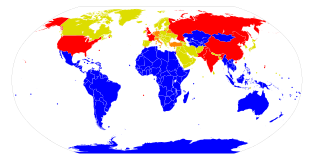Related Research Articles

The Comprehensive Nuclear-Test-Ban Treaty (CTBT) is a multilateral treaty to ban nuclear weapons test explosions and any other nuclear explosions, for both civilian and military purposes, in all environments. It was adopted by the United Nations General Assembly on 10 September 1996, but has not entered into force, as eight specific nations have not ratified the treaty.

The Treaty on the Non-Proliferation of Nuclear Weapons, commonly known as the Non-Proliferation Treaty or NPT, is an international treaty whose objective is to prevent the spread of nuclear weapons and weapons technology, to promote cooperation in the peaceful uses of nuclear energy, and to further the goal of achieving nuclear disarmament and general and complete disarmament. Between 1965 and 1968, the treaty was negotiated by the Eighteen Nation Committee on Disarmament, a United Nations-sponsored organization based in Geneva, Switzerland.

Nuclear proliferation is the spread of nuclear weapons, fissionable material, and weapons-applicable nuclear technology and information to nations not recognized as "Nuclear Weapon States" by the Treaty on the Non-Proliferation of Nuclear Weapons, commonly known as the Non-Proliferation Treaty or NPT. Proliferation has been opposed by many nations with and without nuclear weapons, as governments fear that more countries with nuclear weapons will increase the possibility of nuclear warfare, de-stabilize international or regional relations, or infringe upon the national sovereignty of nation states.

Nuclear disarmament is the act of reducing or eliminating nuclear weapons. Its end state can also be a nuclear-weapons-free world, in which nuclear weapons are completely eliminated. The term denuclearization is also used to describe the process leading to complete nuclear disarmament.
Arms control is a term for international restrictions upon the development, production, stockpiling, proliferation and usage of small arms, conventional weapons, and weapons of mass destruction. Historically, arms control may apply to melee weapons before the invention of firearm. Arms control is typically exercised through the use of diplomacy which seeks to impose such limitations upon consenting participants through international treaties and agreements, although it may also comprise efforts by a nation or group of nations to enforce limitations upon a non-consenting country.

Disarmament is the act of reducing, limiting, or abolishing weapons. Disarmament generally refers to a country's military or specific type of weaponry. Disarmament is often taken to mean total elimination of weapons of mass destruction, such as nuclear arms. General and Complete Disarmament was defined by the United Nations General Assembly as the elimination of all WMD, coupled with the “balanced reduction of armed forces and conventional armaments, based on the principle of undiminished security of the parties with a view to promoting or enhancing stability at a lower military level, taking into account the need of all States to protect their security.”

The Biological Weapons Convention (BWC), or Biological and Toxin Weapons Convention (BTWC), is a disarmament treaty that effectively bans biological and toxin weapons by prohibiting their development, production, acquisition, transfer, stockpiling and use. The treaty's full name is the Convention on the Prohibition of the Development, Production and Stockpiling of Bacteriological (Biological) and Toxin Weapons and on their Destruction.
William C. Potter is Sam Nunn and Richard Lugar Professor of Nonproliferation Studies and Founding Director of the James Martin Center for Nonproliferation Studies at the Middlebury Institute of International Studies at Monterey (MIIS). He also directs the MIIS Center for Russian and Eurasian Studies.

A nuclear-weapon-free zone (NWFZ) is defined by the United Nations as an agreement that a group of states has freely established by treaty or convention that bans the development, manufacturing, control, possession, testing, stationing or transporting of nuclear weapons in a given area, that has mechanisms of verification and control to enforce its obligations, and that is recognized as such by the General Assembly of the United Nations. NWFZs have a similar purpose to, but are distinct from, the Treaty on the Non-Proliferation of Nuclear Weapons to which most countries including five nuclear weapons states are a party. Another term, nuclear-free zone, often means an area that has banned both nuclear power and nuclear weapons, and sometimes nuclear waste and nuclear propulsion, and usually does not mean a UN-acknowledged international treaty.
The United Nations Institute for Disarmament Research (UNIDIR) is a research institute of the United Nations focused on disarmament and international security. It was established in 1980 by the United Nations General Assembly with the stated purpose of informing states and the global community on questions of international security, and to assist with disarmament efforts so as to facilitate progress toward greater security and economic and social development for all.

Patricia Lewis is a British and Irish nuclear physicist and arms control expert, who is currently the Research Director for International Security at Chatham House. She was previously the Senior Scientist-in-Residence and Deputy Director at the James Martin Center for Nonproliferation Studies at Monterey Institute of International Studies (MIIS). She was previously the Director of the United Nations Institute for Disarmament Research (UNIDIR) and the Director of VERTIC.
The Middle Powers Initiative (MPI), a program of the Global Security Institute, is dedicated to the worldwide reduction and elimination of nuclear weapons, in a series of well-defined stages accompanied by increasing verification and control.
The Hiroshima-Nagasaki Protocol is a proposed protocol complementary to the Treaty on the Non-Proliferation of Nuclear Weapons (NPT) being championed by the Mayors for Peace 2020 Vision Campaign gathering the support of local authorities and civil society actors all over the world. It seeks to challenge national governments to follow through on the commitments they made in Article VI the Treaty. In this Article, the parties undertake to pursue "negotiations in good faith on effective measures relating to cessation of the nuclear arms race at an early date and to nuclear disarmament", and towards a "Treaty on general and complete disarmament under strict and effective international control". The Hiroshima–Nagasaki Protocol calls on the States Parties to the Treaty to live up to this "good faith" agreement. It challenges them to adopt an overarching approach to nuclear disarmament, rather than the go-nowhere-slowly step-by-step approach. It challenges the nuclear-weapon states to show good faith through unilateral reciprocal actions. Furthermore, it challenges the States Parties to adopt a legal-binding document, rather than the past political-pledges ignored or undermined by some of the nuclear-weapon States Parties in the past.
The 13 steps are identified in a paragraph of the Final Document of the 2000 Review Conference of the Nuclear Non-Proliferation Treaty, providing a set of 'practical steps for the systematic and progressive efforts to implement Article VI of the Treaty on the Non-Proliferation of Nuclear Weapons'. Article VI is the part of the Treaty that provides for disarmament, including nuclear disarmament.

International Atomic Energy Agency (IAEA) Safeguards are a system of inspection and verification of the peaceful uses of nuclear materials as part of the Nuclear Non-Proliferation Treaty (NPT), supervised by the International Atomic Energy Agency.
Iran convened a conference titled "International Disarmament and Non-proliferation: World Security without Weapons of Mass Destruction" on 17 and 18 April 2010 in Tehran. The theme of the conference was Nuclear Energy for All, Nuclear Weapons for No One.
The 2010 Review Conference for the Treaty on the Non-Proliferation of Nuclear Weapons (NPT) was held at United Nations Headquarters in New York City from 3 to 28 May 2010. The President of the Review Conference is Ambassador Libran N. Cabactulan of the Philippines. UN Secretary-General Ban Ki-moon used the opening of the conference to note that "sixty five years later, the world still lives under the nuclear shadow".

The Middle East nuclear weapon free zone (MENWFZ) is a proposed agreement similar to other nuclear-weapon-free zones. Steps towards the establishment of such a zone began in the 1960s led to a joint declaration by Egypt and Iran in 1974 which resulted in a General Assembly resolution. Following the 1995 NPT Review Conference, the International Atomic Energy Agency (IAEA) held a series of meetings involving experts and academics to consider ways to advance this process.
The Humanitarian Initiative is a group of states that evolved within the framework of the Nuclear Non-Proliferation Treaty (NPT) and nuclear weapons diplomacy more widely. 159 states subscribed to the last iteration of the initiative's Joint Statement in 2015. Since 2013, it led to a series of conferences exploring the Humanitarian Impact of Nuclear Weapons, culminating in the Humanitarian Pledge, issued by the Austrian Government, to "fill the legal gap for the prohibition and elimination of nuclear weapons". The Pledge has been endorsed by 108 governments as of 1 June 2015. The Humanitarian Initiative is seen as a direct answer to the lack of progress in nuclear disarmament.

The Treaty on the Prohibition of Nuclear Weapons (TPNW), or the Nuclear Weapon Ban Treaty, is the first legally binding international agreement to comprehensively prohibit nuclear weapons with the ultimate goal being their total elimination. It was adopted on 7 July 2017, opened for signature on 20 September 2017, and entered into force on 22 January 2021.
References
- ↑ John Hutton (6 October 2008). "Written Answers: Nuclear Non Proliferation Treaty". Hansard. UK Parliament. 6 Oct 2008 : Column 260W. Retrieved 27 November 2012.
- ↑ Shatabhisha Shetty (23 April 2015). "The UK and the NPT Review Conference: Beyond the Status Quo?". European Leadership Network. Retrieved 18 August 2015.
- ↑ Hibbs, Mark (28 November 2024). "IAEA Safeguards and Nuclear Disarmament Verification". Arms Control Wonk. Retrieved 3 December 2024.